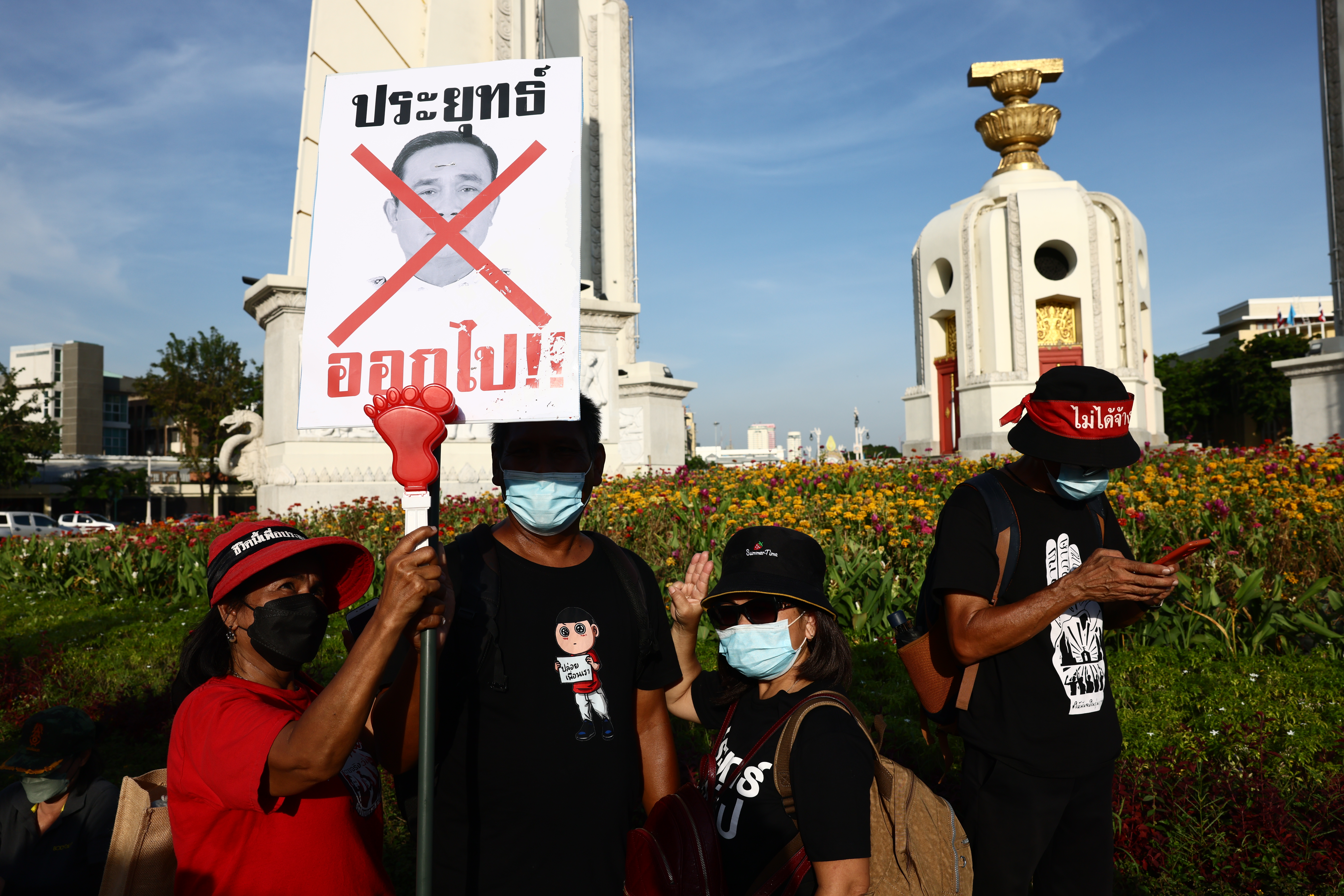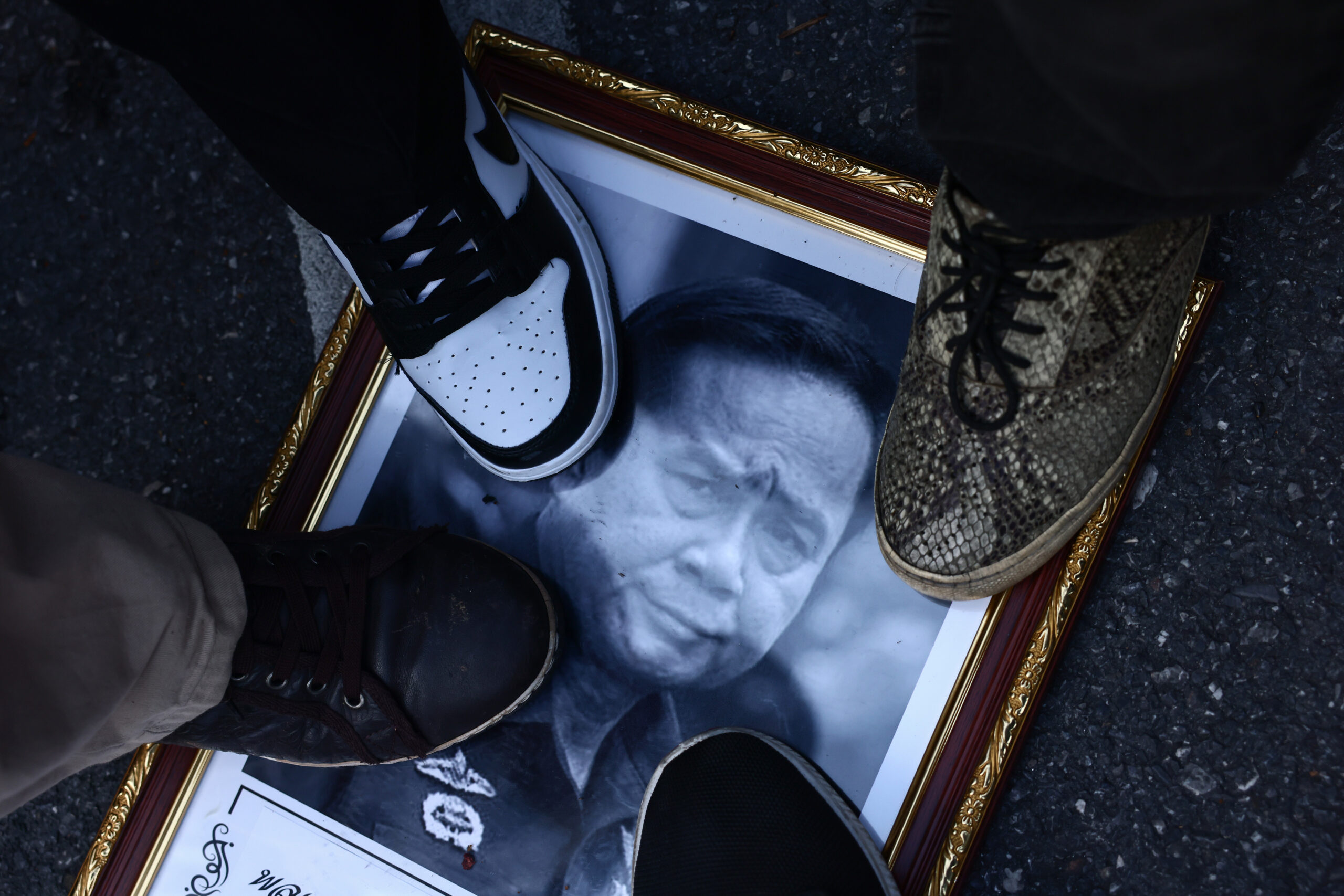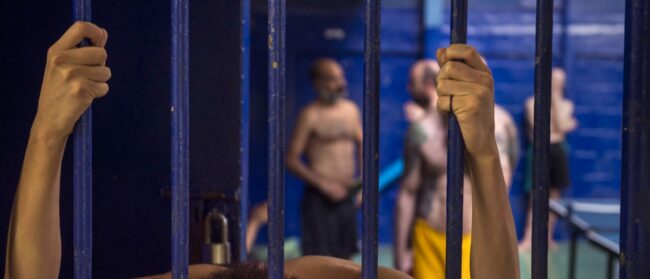Minutes after Thailand’s Constitutional Court hit Prime Minister Prayut Chan-o-cha with a temporary suspension of his PM title, young activists were reluctant to call the decision a victory.
“We want an election immediately! The court is just buying time to find a way to keep him in power,” 23-year-old student activist Benjamaporn “Benja” Apan yelled as a small crowd of students began to gather together quietly on the outskirts of Bangkok. Benja’s recognisable voice soon drew hundreds of protesters to the space.
According to political opposition and huge numbers of the population, the 24 August demonstration marked the end of Prayut’s 8-year constitutional term as prime minister, as they believe he entered politics in a coup in 2014. But Prayut’s supporters argue his term started when he won a controversial general election in 2019.
As the protest continued, the court’s decision produced a climate of mixed feelings, oscillating from suspicion to surprise. Demonstrators from the Thammasat People Party, a group of pro-democracy students at Bangkok’s Thammasat University, carried on with the day’s events calling for immediate democratic elections.
To replace Prayut, the court appointed Deputy Prime Minister Prawit Wongsuwan, another military leader clouded in scandal and corruption allegations. The activists at Thammasat feel he is equally unsuited to lead the country.
“Not only fuck Prayut, but also fuck Prawit too!” Benja said. “They are the same! I don’t like them both. We need an election immediately. An election is the solution now.”
‘Not a democratic government’

Tens of thousands of people took to the streets in 2020 to call for political change. The protesters initially demanded the dissolution of parliament, freedom of expression, and a new constitution. But it was calls for monarchy reform that shattered long-held taboos and shocked the country, resulting in a violent crackdown against the protestors.
Two years later, as hundreds of protesters return to the streets, political analysts say the court’s decision will have little effect on improving Thailand’s democratic landscape.
Titipol Phakdeewanich, a political scientist at Ubon Ratchathani University, said judges are deeply partial, claiming that the court was unlikely to rule against Prayut.
“People lost trust in the Constitutional Court,” Titipol said. “It tends to find a cause or interpretation to make sure that Prayut remains in power…and this is a problem, because that legal mechanism has been used to legitimise the power of the coup maker,”
Titipol stressed that Prayut technically doesn’t have any legitimate power, but the constitution was rewritten by his own military generals to ensure he remained in power after the 2014 coup. He also believes that the 2019 election was a whitewash, where the result was known before the election even began.
“This is not a democratic government,” Titipol said bluntly.
Ken Mathis Lohatepanont, a Thai political analyst and Ph.D. student at the University of Michigan, believes the court is likely to rule in favour of Prayut once the judge’s deliberations are over.
“However, the court has certainly already dealt him a blow with this temporary suspension,” Ken said. “Overall, I believe that the biggest effect the decision has is that it has made the prime minister’s grip on power a lot more tenuous than [before], and it has certainly gotten people thinking about the possibility of a post-Prayut era.”
Ken pointed out that constitutional reform is a key way to introduce a new era of political stability.
“The drafting of a new constitution with popular participation, in order to enshrine democratic principles and the rule of law, would be a good first step in fostering a political environment where democratic norms and institutional forbearance can thrive.”
New wave of resistance

Even as Prayut temporarily steps down, the activists feel there’s little difference between Prayut and some other military-backed leaders.
“Both of them are very disgusting,” said Abhinan “Sydney” Pattanasiri, a 21-year-old political science student at Thammasat University.
Growing up in Hat Yai city in southern Thailand’s Songkhla province, a predominantly Muslim region, Sydney witnessed discrimination against his community. He said the nation’s political system undervalues people from the deep south, a region where a conflict between the Thai military and separatists has burned on for decades.
“I want to change the law and push for a change in society,” Sydney said. “I want to have an impact on the citizens and the economy.”
Sydney joined the anti-government movement after activists like Benja paved the way when she started calling for reforms in 2020 after joining the widely known United Front of Thammasat and Demonstration (UFTD).
Within months, Benja’s commitment to the movement earned her a role as one of the group’s main leaders. But shortly after she began speaking out publicly, she was arrested on royal defamation charges when she criticised King Maha Vajiralongkorn for residing in Germany while carrying out political dealings in the Kingdom.
I want to change the law and push for a change in society…I want to have an impact on the citizens and the economy.”
Sydney, political science student, Thammasat University.
Thailand has some of the world’s harshest penalties for royal defamation, also known as lese majeste, criminalising violators with up to 15 years in prison.
As the 2020 wave of protests escalated through viral hashtags and social media savvy tactics, a new generation of fearless Thai activists sprung up in the biggest challenge to Prayut’s administration yet.
The rallies culminated in hundreds of arrests, including Benja and other prominent monarchy-critics, like Parit “Penguin” Chirawak.
“At the time, I didn’t know anything about the protests. When my friend Penguin asked me to join them, I decided to go,” Benja said. “That’s how I began advocating for change in Thailand.”
Two years later, Benja still feels Thailand needs freedom of expression and monarchy reform to move forward. “If we cannot discuss, how can we have a democracy?” Benja said. “I want the freedom to speak.”
Despite the fact that Prayut has been temporarily suspended, the pro-democracy movement remains vigilant. Thai citizens like Benja don’t buy the decision.
If the government doesn’t grant their demands for elections soon, the activists say they will return to the streets in greater numbers.
“Prayut didn’t come in the right way. He came with a coup,” Benja said. “It was not fair. That move was not aligned with democratic values,” she added.
“I want a real democracy for Thailand”


